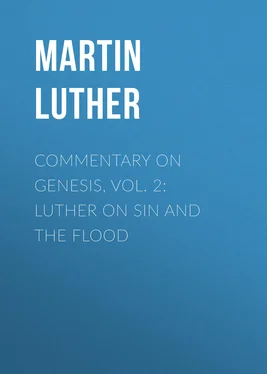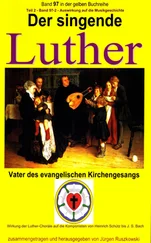Martin Luther - Commentary on Genesis, Vol. 2 - Luther on Sin and the Flood
Здесь есть возможность читать онлайн «Martin Luther - Commentary on Genesis, Vol. 2 - Luther on Sin and the Flood» — ознакомительный отрывок электронной книги совершенно бесплатно, а после прочтения отрывка купить полную версию. В некоторых случаях можно слушать аудио, скачать через торрент в формате fb2 и присутствует краткое содержание. Жанр: foreign_prose, foreign_religion, Философия, foreign_psychology, foreign_antique, на немецком языке. Описание произведения, (предисловие) а так же отзывы посетителей доступны на портале библиотеки ЛибКат.
- Название:Commentary on Genesis, Vol. 2: Luther on Sin and the Flood
- Автор:
- Жанр:
- Год:неизвестен
- ISBN:нет данных
- Рейтинг книги:4 / 5. Голосов: 1
-
Избранное:Добавить в избранное
- Отзывы:
-
Ваша оценка:
- 80
- 1
- 2
- 3
- 4
- 5
Commentary on Genesis, Vol. 2: Luther on Sin and the Flood: краткое содержание, описание и аннотация
Предлагаем к чтению аннотацию, описание, краткое содержание или предисловие (зависит от того, что написал сам автор книги «Commentary on Genesis, Vol. 2: Luther on Sin and the Flood»). Если вы не нашли необходимую информацию о книге — напишите в комментариях, мы постараемся отыскать её.
Commentary on Genesis, Vol. 2: Luther on Sin and the Flood — читать онлайн ознакомительный отрывок
Ниже представлен текст книги, разбитый по страницам. Система сохранения места последней прочитанной страницы, позволяет с удобством читать онлайн бесплатно книгу «Commentary on Genesis, Vol. 2: Luther on Sin and the Flood», без необходимости каждый раз заново искать на чём Вы остановились. Поставьте закладку, и сможете в любой момент перейти на страницу, на которой закончили чтение.
Интервал:
Закладка:
It is said there are 30 million people in the United States with some German blood in their veins. Two thirds of these, or 20 millions, may be said to have some Lutheran mixture in their makeup, but only one and a half million of these 20 millions are communicant members of English and German Lutheran churches. What people in America can show a worse religious record? Yet the tenders of the sheep and lambs are afraid to feed them in the only way they can be fed. Verily whatever you sow, that shall you also reap. Lift up your eyes, behold the harvest! Can you not discern the signs of the times?
It is no wonder that the United States Census of 1890, the latest reliable statistics on the subject, gave the number of Lutheran communicants using only English in this English land at 198,907; General Synod 143,764; United Synod South 37,457; General Council 14,297; Ohio Synod 287; Missouri Synod 1,192—after 150 years of work. Our good German and Scandinavian parents, in the light of these figures, need not fear losing many members to purely English churches. "Reading Luther" in German, Swedish, Norwegian and English will bring better results to old and young than if read only in one language. The Church of the Reformation is not one-tongued, but many-tongued.
English Luther in German and Scandinavian Churches
April 12th, 1910, became a memorable date in the North-west by the introduction of the Scandinavian languages into all the high schools of Minneapolis. German and Scandinavian taxpayers are gradually becoming more interested in having their children learn the language of their mothers in the public schools. This will prove to be a great blessing to children and home, society and state. The Church however will blunder, if she thinks there will now be no need of circulating English literature in German and Scandinavian congregations. Translating Luther and teaching German and Scandinavian are two ways of doing the same thing, for language is not an end, but a means to an end. Many young people are being confirmed in English and they often attend services in foreign languages. Many know more of the language than of the matter preached. When weak in the language they understand better what is preached if they are familiar with the thought. The reason many do not appreciate a sermon with the Luther ring is because they are familiar with neither the language nor the thought. Hence the need of our young people becoming familiar with Luther's sermons and commentaries in English. One understands better in a strange language what he is familiar with. This familiar knowledge would help to bridge the chasm between Lutheran parents and children. Ask parents and they will tell about the "Old Luther Readers," in their native land and tongue. All admit that if the young people are not interested to read Luther in English, they will never read him. All who do will the better understand sermons in German and Scandinavian. The universal reading of the English Luther, on the part of the young people, will therefore help, and not harm, the German and Scandinavian congregations. Luther's teachings thoroughly understood in a living way will bind the young to their Christian convictions, as much as the knowledge of a language binds them to that language. The passive interest therefore, on the part of German and Scandinavian pastors and congregations in circulating the English Luther, as far as their young people are concerned, should give way to active interest, for the sake of their own work in the future. It is important to learn your mother's language. You may do that and forget her faith—Better retain the faith than the language.
J. N. Lenker. The Fiftieth Day (Pentecost), 1910. Minneapolis, Minn.COMMENTARY ON GENESIS
CHAPTER IV
IV. HOW CAIN MURDERED HIS BROTHER AND WAS REQUIRED TO GIVE AN ACCOUNT, AND HOW HE CONDUCTED HIMSELF
V. 8a. And Cain told (talked with) Abel his brother.
107. Our translation adds that Cain said: "Let us go out doors." But this is one of the comments of the rabbins, whose relative claim to credit I have fully shown on a previous occasion. Lyra, following the invention of Eben Ezra, relates that Cain told his brother how severely he had been rebuked of the Lord. But who would believe statements for which there is no authority in the Scriptures? We hold therefore to an explanation which has the warrant of the Scriptures, namely that Cain, finding himself rejected of God, indulged his anger, and added to his former sins contempt of his parents and of the Word, thinking within himself: "The promised seed of the woman belongs to me as the first-born. But my brother, Abel, that contemptible, good-for-nothing fellow, is evidently preferred to me by divine authority, manifest in the fire consuming his sacrifice. What shall I do, therefore? I will dissemble my wrath until an opportunity of taking vengeance shall occur."
108. Therefore the words, "Cain told Abel his brother," I understand to mean that Cain, dissembling his anger, conducted himself toward Abel as a brother, and spoke to him and conversed with him, as if he bore with good nature the sentence pronounced upon him by God. In this manner also Saul simulated an attitude of kindness toward David. "I know well," said Saul, "that thou shalt surely be king," 1 Sam 24, 20; and yet he was all the while planning to prevent this by killing David. Just so Cain now conversed with Abel his brother, and said: I see that thou art chosen of the Lord; I envy thee not this divine blessing, etc. This is just the manner of hypocrites. They pretend friendship until an opportunity of doing the harm they intend presents itself.
109. That such is the true sense of the passage, all the circumstances clearly show. For if Adam and Eve could have gathered the least suspicion of the intended murder, think you not that they would either have restrained Cain or removed Abel, and placed the latter out of danger? But as Cain had altered his countenance and his deportment toward his brother, and had talked with him in a brotherly manner, they thought all was safe, and the son bowed to and acquiesced in the admonition of his father. The appearance deceived Abel also, who, if he had feared anything like murder from his brother, would doubtless have fled from him, as Jacob fled from Esau when he feared his brother's wrath. What, therefore, could possibly have come into the mind of Jerome when he believed the rabbins, who say Cain was expostulating with his brother?
110. Accordingly, Cain is the image and picture of all hypocrites and murderers, who kill under the show of godliness. Cain, possessed by Satan, hides his wrath, waiting the opportunity to slay his brother Abel; meanwhile he converses with him, as a brother beloved, that he might the sooner lay his hands upon him unawares.
111. This passage, therefore, is intended for our instruction in the ways of murderers and hypocrites. Still Cain talks in a brotherly manner with his brother, and, on the other hand, Abel still trusts Cain as a brother should trust a brother; and thus he is murdered, and the pious parents meanwhile are deceived.
Just so the pope and the bishops of our day talk and confer much concerning the peace and concord of the Church. But he is most assuredly deceived who does not understand that the exact opposite is planned. For true is that word of the Psalm, "The workers of iniquity speak peace with their neighbors, but mischief is in their hearts," Ps 28, 3. For it is the nature of hypocrites that they are good in appearance, speak kindly to you, pretend to be humble, patient and charitable, give alms, etc.; and yet, all the while they plan slaughter in their hearts.
112. Let us learn, then, to know a Cain and especially to beware when he speaks kindly, and as brother to brother. For it is in this way that our adversaries, the bishops and the pope, talk with us in our day, while they pretend a desire for concord, and seek to bring about doctrinal harmony. In reality, if an opportunity of seizing us and executing their rage upon us should present itself, you would soon hear them speak in a very different tone. Truly, "there is death in the pot," 2 Kings 4, 40; and under the best and sweetest words there lies concealed a deadly poison.
Читать дальшеИнтервал:
Закладка:
Похожие книги на «Commentary on Genesis, Vol. 2: Luther on Sin and the Flood»
Представляем Вашему вниманию похожие книги на «Commentary on Genesis, Vol. 2: Luther on Sin and the Flood» списком для выбора. Мы отобрали схожую по названию и смыслу литературу в надежде предоставить читателям больше вариантов отыскать новые, интересные, ещё непрочитанные произведения.
Обсуждение, отзывы о книге «Commentary on Genesis, Vol. 2: Luther on Sin and the Flood» и просто собственные мнения читателей. Оставьте ваши комментарии, напишите, что Вы думаете о произведении, его смысле или главных героях. Укажите что конкретно понравилось, а что нет, и почему Вы так считаете.












